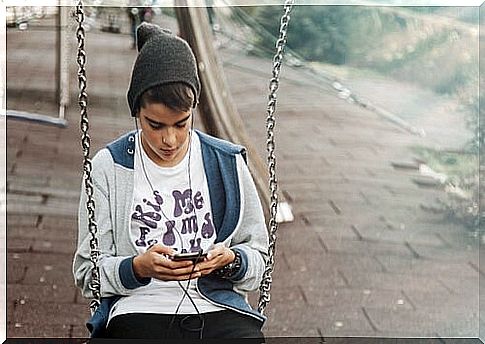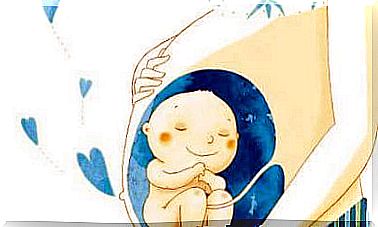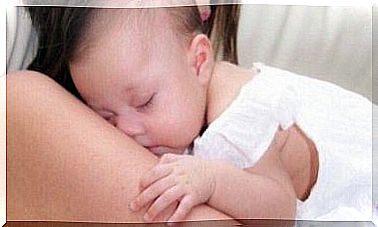5 Signs Of Rebellion In Adolescence. What To Do?

Adolescence is a difficult time for young people, but also for their parents. Discovering the signs of rebellion in adolescence and knowing how to act will help you deal with the situation.
Most parents notice their children entering adolescence rather suddenly. Even though we know in advance at what point in life this phase begins, it is not uncommon to confuse or not notice the first signs of rebellion in adolescence.
These signs do not always appear as a direct challenge to our authority, but they begin to appear derived from the emotional changes, the search for independence and, in general, the psychological and physical changes that characterize this age.
It is worth noting that the arrival of adolescence is not the same for everyone. In some children it may appear at the age of eight or nine, while others enter this maturation process later, from thirteen, for example. This is the beginning of a process of physical, hormonal and psychological transformation that will end at least at age 19.
To help you see if your child may be at the beginning of this phase, we’ve described five signs of teenage rebellion and how to deal with them.
Signs of rebellion in adolescence
As we mentioned before, the signs of rebellion in adolescence do not always appear as clearly challenging behaviors. In fact, they present themselves in a more discreet way. It is a process that will lead to autonomy and the construction of the personality that the teenager will have as an adult. Some of these signs of rebellion are:
1.- Wanting to be alone
It is one of the main signs of rebellion in adolescents and derives from the need for privacy, an aspect that is more important at this stage of life.
Many parents often confuse this behavior with the symptom of a problem in their child’s life. While it’s no exaggeration to make sure everything’s okay, the best thing we can do when this behavior becomes habitual, and there’s no emotional low involved, is to try to make room for our child.
Certainly, solitude must be granted with common sense. If this behavior takes your child away from friendships, affects their school performance or their eating habits, we may suspect that this is behavior that truly requires our attention.

2.- Sudden changes in mood
It is one of the most common signs of rebellion in adolescence. Mood swings are a consequence of hormonal changes that make these young people more emotionally sensitive.
In this sense, a teenager may respond indifferently to our displays of affection, may respond angrily to innocent play, as well as being depressed over simple things like a pimple on the cheek, for example.
It is important to know how to deal with these situations so that we can educate these attitudes, but without being permissive in relation to any mistakes made and keeping our character as an authority at home.
3.- Relative loss of communication
Many children remain very attached to their parents until they reach adolescence. At this stage, it may seem strange that our child has failed to tell us about the day at school and, at the same time, makes new friends with people we don’t know.
The fact that young people are less interested in talking to us and much more in the new friendships they form at this stage of life is a totally natural aspect. As much as many parents feel a little jealous, it’s completely healthy for our child’s emotional makeup. It’s an aspect that will allow you to create your own identity.

Certainly, young people are much more susceptible to getting involved in various social problems during adolescence, such as the consumption of harmful substances, criminality or unwanted pregnancies, among others. In the face of suspicion of this type of problem, it is wise to intervene to avoid the effect of any bad influence.
4.- Realize that they feel ashamed in our presence
Unlike the other signs of rebellion in adolescence, this one in particular is the one that affects parents the most and also the one that we understand the least. At this stage, teenagers are in full search of independence and identity as a mature person, leaving behind those childish or attachment behaviors with their parents.
Our child will show, most of the time, a relative rejection of our presence when he is with his circle of friends.
One thing we must understand about this is that this attitude does not show that our child no longer feels affection, has no more respect for us, or hates us. It’s simply a typical reflex of insecurity, which makes you feel uncomfortable because you can’t appear to a certain level of maturity.
5.- Saying “no”
This is probably the most characteristic feature of early adolescence, as well as one of the first signs of rebellion. Our child will become more independent in all his decisions. If before, for example, he accompanied us without complaining to any family event, he may now be more reluctant to participate in situations that may seem boring and tedious.
The key, as with everything else in life, is to have common sense. If your teenager doesn’t want to eat all the food on his plate, we don’t have to make him like we did when he was a kid.
However, if our child doesn’t want to go to school because he thinks it’s a boring activity or raises another question like that, we must exercise our authority as parents and frame our priorities.









